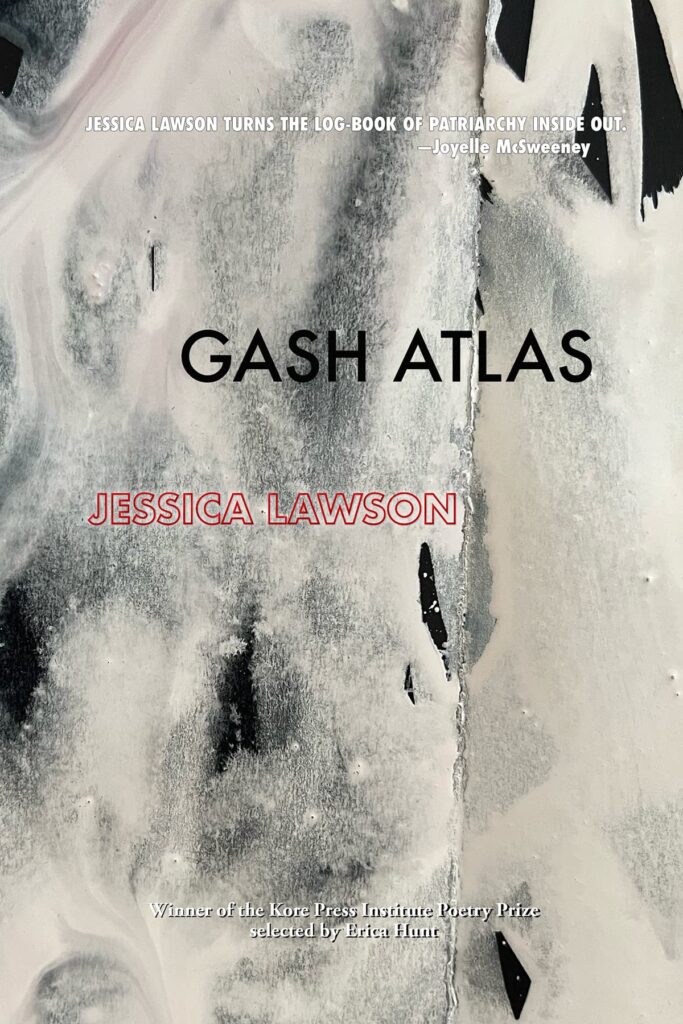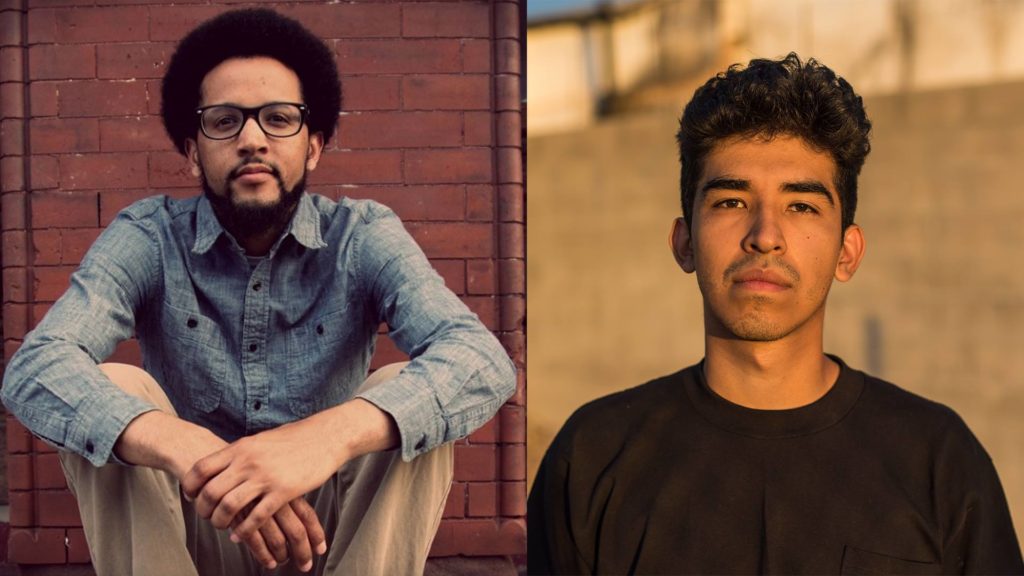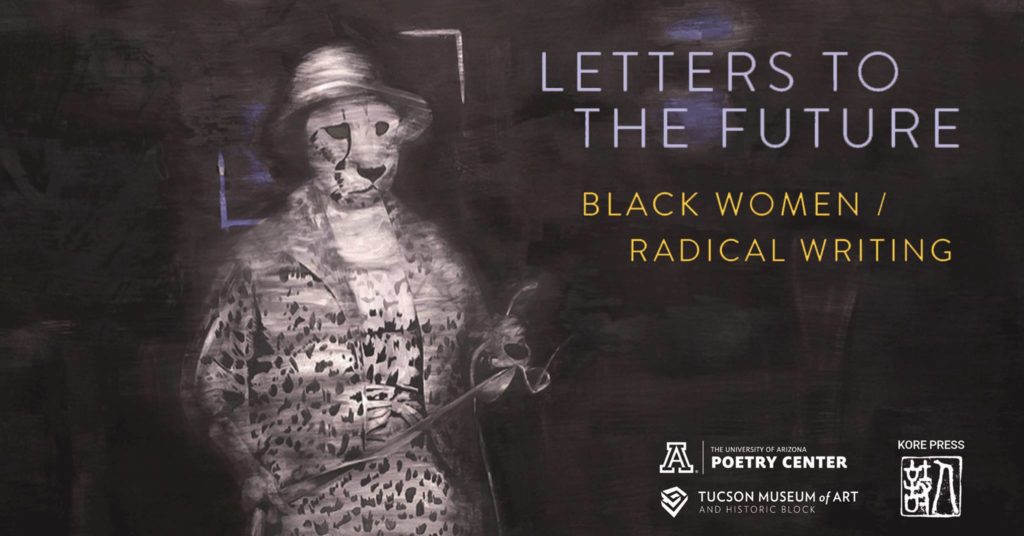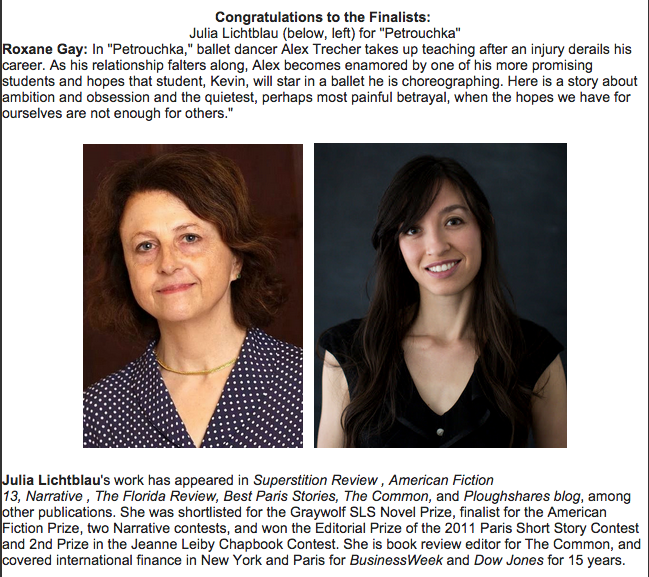Winner of the Kore Press Institute Poetry Prize, Jessica Lawson’s new poetry collection Gash Atlas is both beautiful and devastating. Combining sexual violence, history, and the speaker’s own complicity, Lawson creates a twisted mirror of our own world. Suffusing this world is the figure “Christopher Columbus,” a villain personifying a long legacy of colonization and current political terror. Columbus’s lines are filled with haunting references: “there is no turning the globe can make away from me… The fake news says there is no / oxygen in space, but anywhere is breathable if you know who to pay.” This is a collection that lingers.
Gash Atlas gives us a map of words—the physical and philosophical language—to navigate a visceral reckoning. History and the present move insidiously through bodies that serve as “soft / places to plant menace.” There is relentless difficulty, complexity, setbacks, toughness, rage. There’s hard humor alongside the exhaustion of everyday fear. Actual and symbolic horror, borne and delivered through the tender precarity of motherhood and violently performative femme-presence, show us the unsustainable cost of institutional force. How intimate it is, how prevalent, how invasive even to one’s own private thoughts—“I have a fantasy of lying down in snow and not being.” Jessica Lawson’s poems, images and stagings take the pulse of existence and offer a bold, intimate conversation that shows us just how close we—humans—are to the ultimate wreck, if we continue charting our world according to the persistent peril of ignorance.
Khadijah Queen, author of I’m So Fine: A List of Famous Men & What I Had On
Jessica Lawson’s work has appeared in The Rumpus, Entropy, The Wanderer, Cosmonauts Avenue, and elsewhere. Gash Atlas is her first book. To learn more about Lawson, visit her website.
Behind every great man/ is too much forgiving/ and an awl of blood” writes Jessica Lawson in Gash Atlas, a collection that erodes the statue Christopher Columbus has erected like a gash in each subjectivity colonized by powerful men. Lawson has given us poems that strike a balance between daring to ask the urgent questions and posing them with the care of one who knows how language often operates as a colonial mode.
Raquel Salas Rivera, author of lo terciario/ the tertiary and while they sleep (under the bed is another country)
To purchase Gash Atlas, go here.
We’re also very excited to share an interview that dives deeper into Lawson’s collection. This interview was conducted via email by our Blog Editor, Brennie Shoup.
Brennie Shoup: What inspired you to create Gash Atlas?
Jessica Lawson: I had multiple moments of inspiration, or at least motivation, that defined this project for me. The first was the 2016 election, which transformed my previous plans to write a manuscript about maps into a project that was much more directly political. I began to accrue poems about the terror of that current moment, as well as the violent histories informing it. The character of an antagonist emerged, who would later become Christopher Columbus. Then a second defining moment came, this time more quietly but perhaps more powerfully. It was when I realized that my book wasn’t just, or only, about Trump, but was about the complicity of my own speaker in the violence he was performing. The book didn’t really come together for me until I did the difficult work of problematizing the voice through which the book itself is coming, letting the book question its own speaker. The book and its composition, in real time, became about strategies for fighting against a system that imbues one’s own subject position. It’s why I gave the book an epigraph that came from a protest slogan by liberal white women, and attributed it to Columbus. My book is about maps, about violence, about Trump, and about white womanhood, and I realized each of these through the act of writing it.
BS: Your collection includes what’s been described as visual and poetic “maps.” Would you be able to discuss why you used the forms you did in this collection?
JL: Visually experimental literature is something I’ve been passionate about for a long time, and is reflected in a lot of the work I’ve already published. I think there is sometimes a misconception that visual literature, or experimental literature more broadly, is necessarily apolitical, and I’d love to see that change. Visual and hybrid poetry gets associated with a messed-up school of poetic elitism that uses “experiment” as a way of looking down upon any readers who can’t (or don’t wish to) understand it. And while there are absolutely writers who create experimental literature that way (those are the boring ones), there is also a rich history of activist writers who use experimentation to activate their texts and their readers, jolting us out of our seats by demonstrating that this is not business as usual. So, that’s a big part of why the forms of these pieces are so important to me. Sometimes, the political needs of the time necessitate breaking away from the forms we’ve inherited. Sometimes, when the world feels like it’s breaking apart, the pages and words need to break with it.
BS: Gash Atlas examines both past and present atrocities, with a particular focus on Christopher Columbus. Could you describe what your research process looked like?
JL: I was researching for this book long before I ever knew I’d write it. I remember years ago learning that Columbus was a terrible navigator, that he thought that the globe was shaped like a pear (or breast) rather than a sphere, that he wholly mistook the place he landed for an entirely different continent. I didn’t know I’d ever be using those bits of information to write poems, but once I decided to include Columbus in the book, this entire set of trivia flooded back in. From there, most of the other research had to do with the present moment I was writing in. I wrote about the United State’s opposition to the U.N. resolution banning the death penalty for homosexuality as it happened. I felt like my book wasn’t just reaching back into a history I’d already learned, but sprinting frantically forward after history as it was happening. The very last poem I put in the book, days before my draft was due to my press, responded to the January 6 attack on the Capitol. I was scared as I wrote it, both about what had just happened, and about having to let go of the manuscript before Trump left office. In a way, it feels like he never did.
BS: Do you have plans for future poetry collections or novels?
JL: I’m currently working on a second book of poems (though, like Gash Atlas, it includes hybrid elements that sometimes complicate its status as poetry). It’s about the body’s relationship to money, sexuality, and trauma. I’m getting pretty far along: the structure is falling into place, and a substantial portion of the poems have been written. Now I’m working on making the space to really look at it and push it toward completion (which is a challenge to do while I’m teaching four classes and raising three children). I’m excited and scared about it, which makes me think I’m where I need to be.






